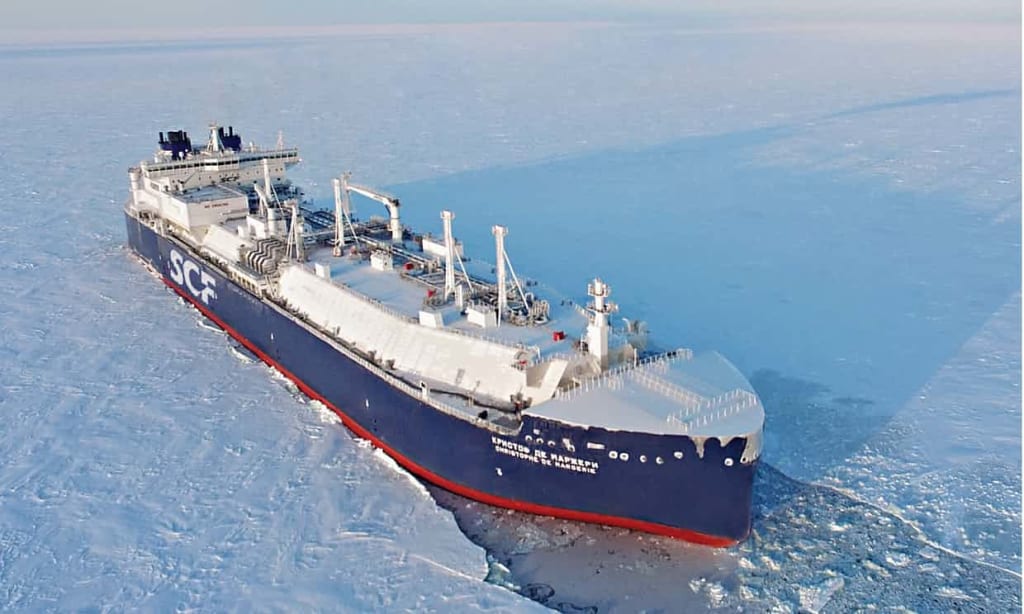Geopolitical Consequences of Global Warming in the Context of Current Domestic Politics
Observations on the Article “Russian tanker sails through Arctic without icebreaker for first time,” The Guardian, Thursday 24 August 2017 16.51 BST, by Patrick Barkham

Hellooooooooo! Rise and shine, time to wake up! The future is knocking on our door and it does not seem as friendly as we might have hoped. No, it’s not the commies, not Islamic fundamentalists who for some reason, supposedly hate our freedom. It’s nature come calling, not quite the way most of us thought it would.
Global warming is no laughing matter, although laugh at it we do. Some ridicule its reality, others humorously speculate on its silver linings. For example, in Manizales, a beautiful city sitting over 7000 feet above sea level in the central range of the Colombian Andes, we joke about finally having a sea shore and beaches. But for still others, the silver lining may be real, anticipated climate change betokens positive geopolitical shifts as frozen wastelands become fruitful and lack of ocean access melts away; the prospects facing Russia and, as the cited article demonstrates, those prospects are now a reality.
The Northwest passage that explorers sought a half millennia ago is now the actuality. It benefits most countries in the Northern Hemisphere to one extent or another, vastly reducing costs and transport time, but benefits least those that already enjoy a natural monopoly on trade and the projection of naval power because of their continental expanse and existing two ocean access, i.e., the United States, Mexico and Canada. But more than any other countries, it appears that global warming will benefit Russia and China, complementing Chinese led plans for a pan European-Asiatic terrestrial trade route; plans whose intention is to shift the geoeconomic trade center from the United States to the naturally contiguous Euro-Asian land mass that once hosted the so called Silk Roads. The myopic, here-and-now centric United States perspective on the environment may be presenting its first economic bills.
The law of unintended consequences may well have a field day with this development. Until now, maintaining the environment we’ve enjoyed during the past several millennia seemed too expensive for neoliberal capitalism, especially in the United States; too constraining, but now that environmental evolution based on disregard for the causes of global warming is showing its cards, minimization of further climate change may seem essential for preservation of United States-centric economic hegemony. On the other hand, that may well already be too late.
How ironic. Nature seems to be leveling the planetary playing field just when it seemed United States’ aspirations for status as the Novi Romani Imperii seemed to be coming to fruition. That, of course, may explain the otherwise inexplicable risk of nuclear confrontation with Russia and China (and anyone else who’ll play) in which the United States has been recently engaged. It might explain the Ukrainian coup, the fury over Russian success in the face of United States failures in the Middle East, the insistence on continuing the conflict in Afghanistan, the purported pivot to the East and the ludicrous Russiagate saga. Desperate gambits designed to forestall the entropic momentum which we suddenly find ourselves confronting. But explanation is not equivalent to wise strategic decisions.
Those who justify the concept of the Deep State do so based on the premise that as a decision-making tool democracy is dysfunctional, a mere popularity contest focused on the present and unable to facilitate the difficult choices required for long term strategic success. So, as candidate Hillary Clinton inadvertently observed (inadvertent at least with respect to voters), politicians have to speak with what indigenous Americans referred to as a forked tongue, placating Pablum for the voters in order to get elected, then another flavor of placating Pablum for campaign contributors and finally, stark self-centered realism for our real leaders. Of course, while that might work, it would at best be dysfunctional if as Lincoln suspected you can’t fool all of the people all of the time (witness the 2016 presidential election) and, at worse, it would completely fail if the resulting geopolitical gambits proved unsuccessful, possibly the emerging case today.
The Deep State, as a benevolent and wise parent concept, is based on the belief that the People are too dumb, too insecure, too lacking in resolve and discipline to trust with their own fate and ours (“ours” being the Deep State masters, the ubiquitous “they”). Of course, empirical analysis, as demonstrated in Thomas Piketty’s seminal treatise Capital in the Twenty-First Century, discloses that our Deep State masters are not benevolent but utterly selfish, institutionally selfish and probably “irreformably” selfish as well as seminally lacking in wisdom or strategic thinking, for us, the worst of all worlds. Perhaps sensing that we are awakening to that reality, the masters of the Deep State are deploying their full panoply of tools in the United States, i.e., the mainstream media, the two captive major political parties, the intelligence and military-industrial complex communities, and, the global financial community to try and arrest the consequence of a potential popular awakening, a new enlightenment that might lead to a new renaissance, one beyond their control. Divide and conquer and then, maintain divided and maintain conquered has been their tool, polarization for fun and profit regardless of the social disruption and threat of civil conflict; you know, like the ludicrous conflict over historical memorials in which we currently find ourselves embroiled, distracted from real issues, real problems, real solutions.
So, for now, at least, the Deep State finds itself in a quandary of its own making. Having selected Donald J. Trump as the least dangerous challenge to their chosen lackey-as-president but having lost, lost badly as a consequence of self-delusion and overconfidence, it is now pulling out all the stops to arrange for a do-over, or, as some of us call it, a soft coup if possible or whatever it takes if necessary (think JFK). But while engaged in a desperate, apparently existential battle to retain control, nature patiently moves in its chosen direction, changing the rules of the game, replacing players on its terrestrial chess board by changing the nature of the board.
Are you old enough to recall when our economic motto was, “what’s good for General Motors is good for America” until suddenly, the rules were changed for the benefit of the few and powerful? And now, that the motto “what’s good for America is good for the world” also seems passé as the world realizes that the rules work otherwise and has started to rouse from its trance?
United States' power is based on three pillars: first, cultural, the power projected from Hollywood, our music industry, our literary tradition and the resulting 24/7 propaganda machine; secondly, monetary, the dollar is the world’s common currency, regardless of its lack of intrinsic worth; and finally, military power based on technological innovation and a ruthless willingness to use it. All three are essential but loss of credibility in the first, the rise of viable alternatives to the second and overuse of the third all presage the possibility of a tectonic shift in power, and if that were to happen, there are a great many chits due all over the world based on our constant misconduct towards others, something they’ve had to swallow for a couple of centuries now, and if things remain as they are, we will not like the feel of angry chickens coming home to roost.
If a shift in the balance of power is inevitable, is there a way for us to maximize the possibility of a soft landing instead of a brutal crash?
Probably, we have the British example. They had the wisdom, starting as long ago as 1870, of realizing that their empire had attained its zenith and that its fall was likely. Realizing that they bet on their accurate, well-reasoned prediction that the United States, then a traditional enemy and emerging rival, would likely take its place. So instead of aggravating existing tensions, they changed their strategic enmity for a collaborative relationship, something that required a great deal of sophisticated public relations and a bit of memory washing, after all, it had been only a half a century earlier that the British had torched the United States capital. It wasn’t that in 1870 the British were surrendering to the inevitable but that they were hedging their geopolitical bets. Something we need to do by establishing mutually beneficial and collaborative relationships with the emerging powers to our east, sharing what we now have in the hope they’ll share the future with us as well, a win-win scenario rather than a confrontational future where, in the long term, we’ll find that fate has already given us all the winning hands we’re going to get.
I dislike it when pessimists refer to themselves as realists and refer to optimists as dreamers. I especially hate it when I have to assume the realist’s role. I prefer to think of myself as a creative optimist whose solutions lead people to perceive of me as a man of vision, but sometimes that too requires a cold splash of realism. When I started my career in academia almost half a century ago, I developed an options game for my students comprised of a pyramid with options on the latitudinal axis and time on the longitudinal. The lesson was simple, time eliminates options and thus, failure to decide is itself a decision. Thus not only does the exercise of options reduce other options, non-exercise does so as well. In other words, we need to get off of our buttes and act to save our future and do so now. It may already be too late to take the environmentally friendly decisions that might have preserved the environment in which we flourished, but there are options we can still exercise to attain our best remaining available future.
Given that nature now seems to be on someone else’s side and that our own socio-civic milieu seems set on self-destruction, it might be prudent for us, as a People, to divorce our current Deep State masters and their minions, participating in internal repair and renovation by repairing or constitutional scheme for governance and concurrently, rejecting our dysfunctional duopoly and finding alternative sources for the information we need to free ourselves from our induced somnolence, making it possible for us to plan for and implement the changes required for a prosperous, equitable and just future for our progeny so that a hundred years from now they bless us for our foresight rather than curse us for our lack of vision._______
© Guillermo Calvo Mahé; Manizales, 2017; all rights reserved. Please feel free to share with appropriate attribution.
Guillermo Calvo Mahé (a sometime poet) is a writer, political commentator and academic currently residing in the Republic of Colombia although he has primarily lived in the United States of America (of which he is a citizen). Until recently he chaired the political science, government and international relations programs at the Universidad Autónoma de Manizales. He has academic degrees in political science (the Citadel), law (St. John’s University), international legal studies (New York University) and translation studies (the University of Florida’s Center for Latin American Studies). He can be contacted at [email protected] or [email protected] and much of his writing is available through his blog at guillermocalvo.com.
About the Creator
Guillermo Calvo
Former chair, Political Science, Government and International Relations Programs at the Universidad Autonoma de Manizales. My university degrees are in political science, law, international legal studies and translation studies.






Comments
There are no comments for this story
Be the first to respond and start the conversation.